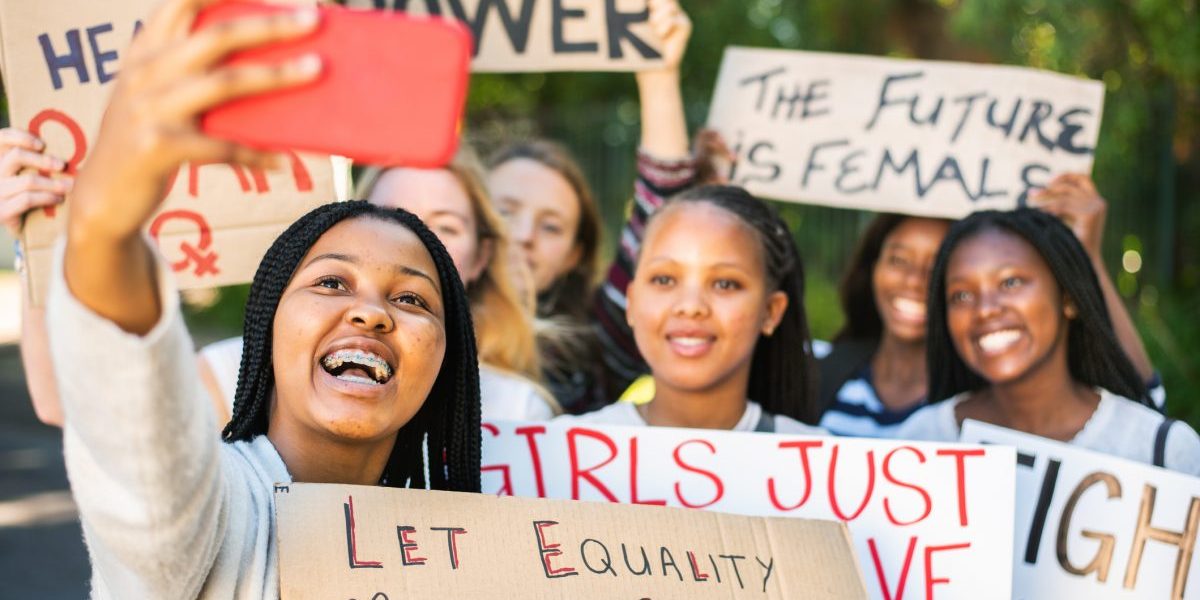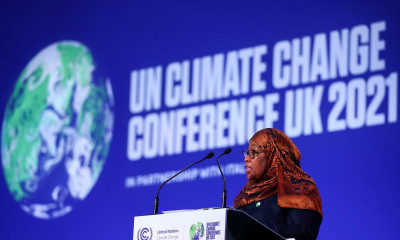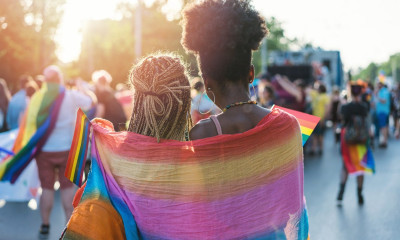We, the youth of South Africa, acknowledge that addressing the position of women in South Africa requires more than discussions and workshops – we affirm the need to rebuild our local, provincial, and national spaces to create sustainable and equal structures that support women.
As youth will continue the process of gender equality, we recognize the significance of policies that allow women access to opportunities and spaces they have been historically excluded from. We envision a post-COVID-19 society that is just, equal and intersectional. To manifest our vision, we have developed the following recommendations:
Female leadership
The lack of meaningful representation of young women in the South African decision–making space poses a threat to South Africa’s future for gender equality. This may be caused by the marginalisation enforced by a patriarchal society that makes South African women and LGBTQIA+ individuals scarce in leadership. Additionally, the limited representation of these marginalised communities in leadership is viewed as being tokens. The lack of representation poses a threat to their right to education, freedom of movement and choice, equality, dignity, and their right to life as a woman or LGBTQIA+ individual. We recognise that these marginalised individuals are held back due to the societal norms instilled in women from a young age, and have the ability to shape and influence life for many years after. It is extremely important to enhance leadership led by women throughout South Africa, recognising they are significant and productive members of our society and just as capable as men. In order to enhance this leadership, South Africa must start action from the grassroots level. First and foremost, women need better platforms. To enhance women’s leadership, local, provincial and national governments need to ensure that they provide a platform for women and non-binary individuals. We urge the educational system to play a stronger role in prioritising gender equality in education and encourage female leadership within the educational space.
Intersectionality
We call for South African society, including all stakeholders, to adopt a more intersectional approach when facing issues such as gender structures, gender-based violence, race and class, in relation to women and LGBTQIA+ individuals. Some women are more vulnerable to oppression than others, especially women of lower socioeconomic status. There are links between the position of women and economic class, substance abuse, gender-based violence (GBV), education and employment. We encourage more women to speak up on their experiences and become leaders within their own communities, bridging the gap between different female narratives such as race, upbringing, sexuality, education and employment. Women of colour, Black Indigenous and People of Colour (BIPOC) and other marginalised communities of women should be provided safe spaces, and the community needs to hold stakeholders more accountable for the inclusion of diverse voices of women within their space.
Language barriers in gender/economic equality
Language plays a vital role in women’s empowerment. We invite NGOs, government and civil society to engage further around how best to empower women in South Africa without language being a barrier, as many vulnerable women tend to have less understanding of the English language. Using a familiar language creates a unified platform that engages more women and LGBTQIA+ individuals in the conversations around GBV, patriarchy, education, employment and the overall position of women in South Africa. As the Youth Policy Committee Gender Working Group, we will initiate a project to create informative tools that come in different languages to help break the language barrier. We encourage more institutions and organisations to adopt a more language inclusive approach around female discussions and dialogues.
LGBTQIA+ community
Male and female sexualities remain heavily influenced by patriarchal systems that privilege heterosexuality. A patriarchal model of gender and sexuality perpetuates unequal power relations between men and women and entrenches male privilege, both of which contribute to high levels of sexual- and gender-based violence against women in South Africa. Such a rigid and oppressive model of gender and sexuality limits the courses of action available to men, in that a normative male identity is associated with expectations of invulnerability and self-reliance, which, in turn, contribute to risky sexual behaviour and low health-seeking behaviour among many South African men. Through adopting an affirmative stance towards sexual and gender diversity, we appeal to psychology professionals to assist in the transformation of unjust sexual and gender systems, the harmful effects of which extend beyond their impact on LGBTQIA+ individuals and to all South African citizens. Safe spaces provided by local communities should allow men, women and LGBTQIA+ individuals the ability and opportunity to voice out and address the inequalities between gender and the lack of women and LGBTQIA+ representation on all platforms. Additionally, the queer feminist community and disabled women of colour also need to be placed at the forefront. Government, civil society organisations and citizens need to acknowledge the voices of these marginalised communities and the experiences of trauma, bullying, oppression and exclusion. Additionally, hate crimes need to be acknowledged as a priority and concern in South Africa. The queer community of colour also needs support.
Gender-based violence in South Africa
GBV is an issue of major concern in South Africa – rated as the ‘Worlds Rape Capital’, a woman is sexually assaulted every 17 seconds. South Africa displays a culture of violence, stemming from deep rooted institutionalism. In addition, the culture outwardly focuses on tensions of race and class rather than the oppression of gender, even though GBV necessarily relies on male domination and female subordination. Women and children who are victimised based on their vulnerability and marginalisation are predominantly limited from being protected by the defence justice system, as perpetrators are often condoned for their criminalities. Young women and girls who dress ‘provocatively’ are simultaneously targeted and victimised by perpetrators and as a result, they are victims of rape and murder assaults. Conversations about GBV behaviour/gender norms should not be treated as a taboo subject and needs to be taught from a young age through schools, communities, and religious discussions.
We call upon the government to assist in creating safe spaces for women who combat GBV and are excluded by their communities, and to address topics around mental health and stigma attached to women and LGBTQIA+ individuals who are victims of sexual assault. Many organisations have been formed to curb GBV but lack funding. We encourage the government and other stakeholders to be more invested in the state of women and LGBTQIA+ individuals, which can be achieved through annual reporting on the progress of implementing policies, such as the National Strategic Plan on GBV and Femicide. We thus call for more accountability and transparency, and better monitoring of the implementation of such policies.
Sexual harassment in places of education and employment
Sexual harassment in places of education and employment needs to be addressed. Misogynist behaviours motivate men to forcefully dominate women and children and can lead to mental, emotional and physical harassment and abuse. We recognise that sexual harassment in schools severely interferes with the educational opportunities for young females in several ways. Students are often silenced due to the power imbalance between teacher and student, and fear that the assault or harassment will affect their educational and academic careers. This can be attributed to poor implementation of sexual harassment policies in schools leading to students being affected. We call upon the government, international organisations, NGOs, local organisations and the public at large to create awareness on sexual harassment in places of education and employment. Additionally, it is important to create awareness around the interventions women, and LGBTQIA+ individuals can take to protect themselves from harm. We urge NGOs with the ability to assist with sexual assault to extend themselves to the spaces they are needed.
The role of masculinity in female dialogues
One of the societal barriers faced by women is the hypocritical behaviour towards women in society and those who feed into it. Women are expected to be successful and claim jobs that are dominated by men because we live in ‘more modern times’ yet a great number of people still carry the notion that women should retain more traditional roles, limited to taking care of the household. That ideology is pushed onto young girls and women. We acknowledge that older generations of women can perpetuate patriarchal ideals. We encourage civil society and NGOs to create awareness around current experiences of women. Patriarchy is a system that favours men. These men are identified as the biggest perpetrators of GBV and sexism, and have access to more opportunities than women and LGBTQIA+ individuals. Men, therefore, also need to be a part of these dialogue spaces to understand the consequences of their actions or silence. Therefore, we urge all men, regardless of background, history, economic standing, racial identity, sexual orientation or belief, to be a part of conversations relating to female issues ensuring these are not isolated conversations held only by women and LGBTQIA+ individuals.
Accountability
In order to be held accountable, men must first realise that the root of the problem is the patriarchal system we live in. The standards, behaviour, ideals and roles placed on women, men, and LGBTQIA+ individuals differ, and awareness needs to be brought to these defined gender roles. We acknowledge that bias and ignorantly perpetuating injustice are aspects that need to be addressed, and this can be done through education, awareness and open dialogues. We acknowledge that there exists many policies and plans to support women, however, there is a lack of proper implementation, thus allowing for a lack of accountability.
Education and employment equality
Education
Limited resources in rural areas can prevent marginalised young women from accessing basic education. Furthermore, the lack of comprehensive sex education in primary and high school adversely affects the position of women in society. In 2019, only 5% of South African schools provided comprehensive sex education. The Life Orientation syllabus is mainly focused on heteronormative sexual relations and HIV education. There is no comprehensive focus on sexual orientation, the gender spectrum, consent, and the patriarchy – all issues with inherent links to GBV and LGBTQIA+ violence in our country. We believe that the syllabus needs to be updated to include these issues, with input from young people. Primary and high schools should further aim to tackle gender norms within extracurricular activities, such as sports or creative activities. Educational facilities should also include boys in discussions around the position of girls in society. The position of young women in primary and high school influences their access to tertiary education – women are often instilled with fears and insecurities as they are not fully equipped with the necessary mechanisms to prepare them for tertiary education. Furthermore, funding opportunities such as bursaries and scholarships, particularly in certain fields, are most likely to be afforded to men. Additionally, women of colour in tertiary spaces are often mistreated and degraded.
Employment
Although great improvements have been made regarding the rights of women to work, the generational ideology handed down to each demographic and the hypocritical views that are upheld forces women to adapt to having fewer opportunities. Women who make up more than half the national population should be strengthened economically, not only as a means to encourage economic growth but as a way of propagating women’s human rights. When we invest in women and work to abolish inequalities, they have a better chance of becoming significant players in various spaces of society. Even though women have made great strides in their standing in society there is still a lack of real transformation because of male resistance and prejudices. The ideology that women are accommodated today is simply based on biased employment policies and management strategies. Businesses need to start making a more noticeable effort to implement gender diversity strategies. Projects to jumpstart this movement could be by positively discriminating in favour of women by promising a bonus to the company for meeting a certain standard number of women employees, staff, employers as well as in management positions. Resources should be provided by government officials to educate women based on job searching mechanisms.
Stakeholders and their relation to female equality
We acknowledge the various stakeholders that have supported marginalised communities and encourage more support in creating safe spaces, especially for marginalised women. Stakeholders should see themselves as allies and not saviours, and engage with women and LGBTQIA+ individuals as their equals.
Government intervention
We acknowledge the efforts by the South African government in drawing up policies that offer opportunities and developments for women in South Africa. Legislations and laws show that action has been taken by the national government to ensure that women have access to the necessary services and protections, and the right to be equal citizens of South Africa. This includes the Presidential Summit Against Gender-Based Violence and Femicide that was also instrumental in identifying key interventions to address not just GBV, but also the wider challenges women and children face with regards to safety and security, poverty and access to economic opportunities. But even though the government and civil society draft statements and policies that seek to protect and empower women, as stated before, the actual implementation of these policies in society needs to be addressed. Sustainable and equitable measures to protect women and make all necessary resources and services accessible for them is the goal, and this can be achieved through the support of the government and other stakeholders. The South African government must show their support to increase and enhance the number of women to access essential support services. Another gap that needs to be addressed by government officials and transnational organisations is the issue of the digital divide. Marginalised women and girls across Africa are faced with poverty and the digital divide, which further exacerbates barriers to literacy and employment. We call upon the government to work with the youth to create more inclusive short-term and future-focused policies to better benefit marginalised individuals in society.
Local conversation
Local communities should create “word of mouth” spaces that encourage and develop the representation of women. Civil society and local communities should be encouraged to create and sustain platforms that allow men and women the opportunity to discuss traumas and personal experiences. These conversations need to be encouraged within rural spaces and marginalised communities. We, therefore, urge government and NGOs to engage with faith-based organisations and spiritual institutions to address issues faced by women in South Africa. We further invite stakeholders to engage with local communities and work with local leaders in handling such safe spaces and platforms.
Social media
Social media plays a significant role in shaping public perception and should be used as a tool to dismantle the oppression faced by women. We encourage government and various other stakeholders to maximise the influence of social media platforms, as well as give time to engage in conversations related to female issues in this space.
This statement was produced by the Youth Policy Committee Gender Working Group through a series of dialogues with various young people from different backgrounds across South Africa. It was presented on 9 August 2021.







